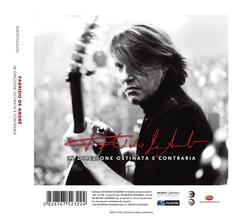Crêuza de mä - Fabrizio De André
$ 3.99 – $ 4.99
A curious, fascinating release, Creuza de Ma was named by none less than David Byrne as one of his favorite albums from the '80s -- and, for once, it seems like he really meant it beyond reasons of simple cred-seeking.
Creuza de Ma itself isn't in fact an Italian album per se, but a Genoese one, with all lyrics sung in that particular dialect, a blend of Italian, French, and Catalan that's different enough from Italian to require full translations of the words into that language in the liner notes.
The sense of distance and a sense of "another place" is further heightened by the subject matter of many of the songs, focusing on historical figures or incidents in the past.
Thus, "Sinan Capudan Pascia" tells of a 17th century Italian who became a Turkish general, while "A Dumenega" tells the story of a Sunday promenade by a group of prostitutes.
Above and beyond the lyrics, though, is the music, an attractive blend of state-of-the-art instruments and, in de Andre's singing, gently mystic singalongs, with more than a little touch of sea shanties, Mediterranean style.
His voice shows both his years of singing and his skill, practiced without being either oily or dispassionate, a quiet, reflective delivery well suited to the sun-baked atmosphere captured in the cover art.
As for the music itself, there's a sense of modern clichés being avoided -- a song like "Jamin-a" suggests Dead Can Dance's swirl of percussion and trance, a folk dance on electric instruments and with drum machines.
Besides the excellent title track, the longest cut on the album and a fantastic introduction, other highlights would have to include "Sidun," with truly haunting and mysterious music and some of de Andre's most captivating singing, and the previously mentioned "A Dumenaga," a low-key danceable delight.
| Title/Composers | Performer | Listen | Time | Size | Size | |
|---|---|---|---|---|---|---|
| 1 | Creuza de MäFabrizio De André, Mauro Pagani | Fabrizio De André | Play | 06:16 | 14 MB | 39 MB |
| 2 | Jamin-AFabrizio De André, Mauro Pagani | Fabrizio De André | Play | 04:52 | 11 MB | 32 MB |
| 3 | SidunFabrizio De André, Mauro Pagani | Fabrizio De André | Play | 06:25 | 14 MB | 37 MB |
| 4 | Sinan Capudàn PasciàFabrizio De André, Mauro Pagani | Fabrizio De André | Play | 05:32 | 12 MB | 33 MB |
| 5 | 'A PittimaFabrizio De André, Mauro Pagani | Fabrizio De André | Play | 03:43 | 8 MB | 19 MB |
| 6 | A DumenegaFabrizio De André, Mauro Pagani | Fabrizio De André | Play | 03:40 | 8 MB | 24 MB |
| 7 | D'ä mê riva | Fabrizio De André | Play | 03:04 | 7 MB | 15 MB |
| 33 mins | 76 MB | |||||
| 33 mins | 201 MB | |||||
| Artist | Job | |
|---|---|---|
| 1 | Fabrizio De André | Composer, Primary Artist |
| 2 | Mauro Pagani | Composer, Producer |
Fabrizio De André
| Quality | Format | Encoding | Description |
|---|---|---|---|
| Standard | MP3 | 320kps 44.1kHz | MP3 is an audio coding format which uses a form of lossy data compression. The highest bitrate of this format is 320kbps (kbit/s). MP3 Digital audio takes less amount of space (up to 90% reduction in size) and the quality is not as good as the original one. |
| CD Quality | FLAC | 16bit 44.1kHz | FLAC is an audio coding format which uses lossless compression. Digital audio in FLAC format has a smaller size and retains the same quality of the original Compact Disc (CD). |







